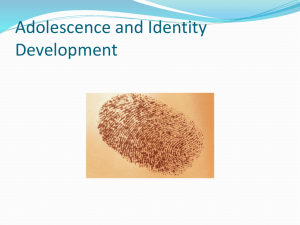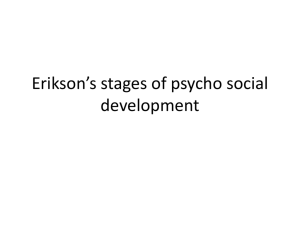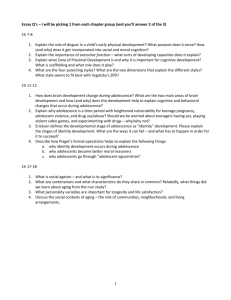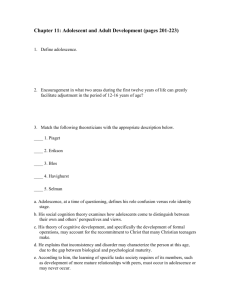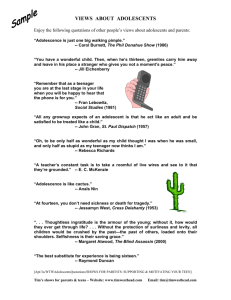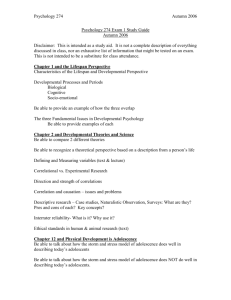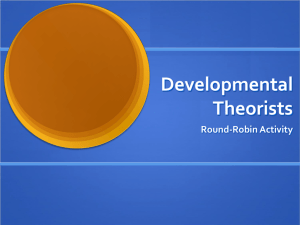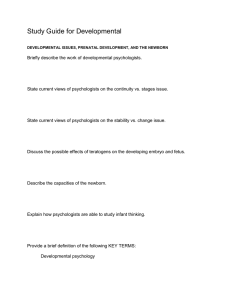Introduction to Psychology
advertisement
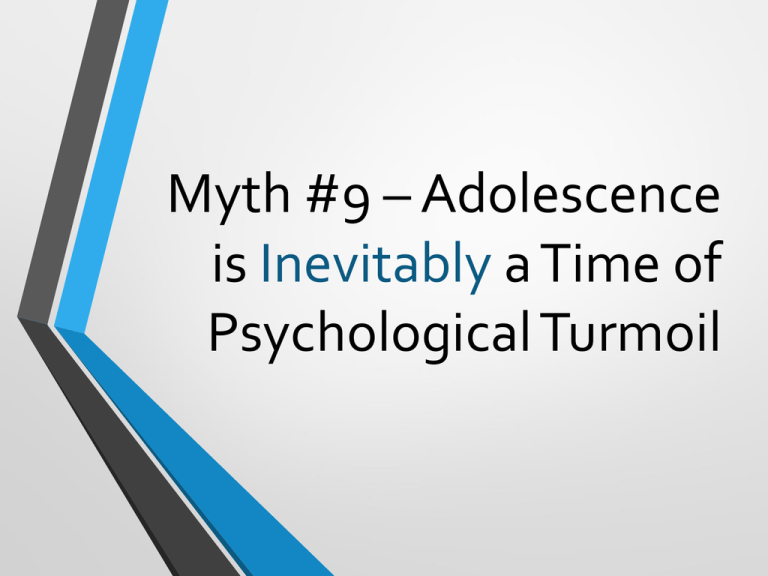
Myth #9 – Adolescence is Inevitably a Time of Psychological Turmoil Developmental Psychology • Developmental psychologists study the lifespan from prenatal development (in utero) through death. • They research THREE major areas of development: • • • Physical Development Cognitive Development Social Development Adolescence • This unit revolves around the period of your lifespan that falls between childhood and independent adulthood. • Our society defines adolescence as the period time that begins with puberty (physical maturation) and ends with social and financial independence (adulthood). Lifeline • Before we reflect on the myth of adolescence, let’s talk about some of the major influences in your life physically, cognitively and socially. • Complete your lifeline. Reflection • 4. What were the major influences? What did you have in common? What were your differences? Nature vs. Nurture Nature • • • Our inherent (inborn) abilities, talents, capacities. We are who we are from the inside (biology) out Includes: • genetics, biological processes/brain/chemicals Nurture • • • Our learned skills, abilities, talents and capacities. We are who we are from the outside (environment) in. Includes Learning from: • experience, conditioning, training, observation, practice, reward, punishment,teachers, friends, society, parents, etc. Where Do You Stand? 6. Mark the line. Think of your lifelines. What have you been most influenced by in your life? Genie the “Wild Child” • • As you watch, make a claim and gather evidence to support that claim. Is Genie the product of her nature or her nurture? https://www.youtube.com/watch? v=hmdycJQi4QA What was your argument? What evidence did you find to support your argument? What is Adolescence? • https://www.polleverywhere.com/free_text_polls/HdKjiN JOGYKVPMq Adolescence • “Storm and stress” – G. Stanley Hall (1904) • “To be normal during the adolescent period is by itself abnormal.” – Anna Freud (1958) • “The teenage years can be a parent’s worst nightmare.” – Dr. Phil • How do your responses compare? Sources of the Myth a. Stereotyped media portrayals b. Kernel of truth What Do People Think? “The majority of adolescents show neurotic or antisocial behavior sometime during adolescence.” • 62% of medical residents agree • 58% of nurses agree Describe some shows/books/news portrayals that support this statement. The Facts • At most 20% of adolescents experience turmoil • Less in non-Western societies • The substantial majority of people experience positive moods and harmonious relationships with parents and peers. • Those that experience severe conflict with parents tend to also exhibit one or both of the following: • • Clear-cut psychological problems (depression/conduct disorder) Disrupted family backgrounds Three Components of this Myth (Where does the “kernel” come from?) a. Conflict with parents (cognitive and social) b. Moody instability (physical) c. Risky behavior (physical and social) Risky Behavior/Emotional Changes and PHYSICAL Development • Puberty: Define: The beginning of adolescence. Marked by the beginning of physical and reproductive maturation. Primary and Secondary Sex Characteristics Primary • • Required for reproduction Secondary • Only one per sex: • • Testes Mature – Males Ovaries Mature – Females • • Any trait that develops at the same time as primary traits develop. NOT required for reproduction “Bonus” traits that develop asymetrically Examples:? Dr. Sarah-Jayne Blakemore • http://www.ted.com/talks/sarah_j ayne_blakemore_the_mysterious _workings_of_the_adolescent_bra in.html Physical Development and the Myth • Moody instability (secondary characteristics, amygdala) • Risky behavior (prefrontal cortex, amygdala) Jean Piaget • Developmental psychologist • Outlined the stages of COGNITIVE development • Piaget agreed that cognitive processes followed a series of stages, and even though certain children may reach stages before other children, the order of stages in invariable. Cognitive Development Cognition All the mental activities associated with thinking, knowing, remembering, and communicating Answer the following questions on your own. List EVERYTHING you can think of …. • 18. • 19. Paperclip Three arms Concrete vs. Formal Operational Thought Formal (12 ) Concrete (7-12) • • • • Object must be present to think about it Logical thought Rational thought Experience-based • • • • • • • • • • Objects don’t need to be present to think about them Logical thought Rational thought Abstract thought Hypothetical thought Reasoning not tied to experience Imagination, flexibility, range of comprehension http://educ613piaget.weebly.com/formal-operationalstage.html Arithemetic vs. Algebra Sarcasm 21. Do you think formally or concretely most of the time? Explain. 22. Name some common issues teens face socially. List anything and everything you can think of. Erik Erikson • Developmental psychologist • Said that we go through eight stages of social development in our lifespan • Each stage involves an internal conflict that must be resolved • If we don’t resolve the conflict, we will fixate on it throughout our lifespan until it is resolved and it might affect later stages Erik Erikson Identity vs. Role Confusion • The primary social accomplishment for adolescents, according to Erikson is to develop an identity or live a life filled with role confusion. • Teenagers work at refining a sense of self by testing roles and then integrating them to form a single identity, or they become confused about who they are. James Marcia • Take the OM – EIS to determine your Ego Identity Status • Objective Measure of Ego Identity Status • Where are you in the process of forming your identity? • Answer each question as honestly as you can. Scoring • Add the numbers you listed for the following questions four separate categories. Circle your high score at the end. 1. 3, 17, 21, 24, 27, 28, 37, 38, 39, 41, 44, 50, 58, 62, 63, 64 2. 1, 2, 4, 6, 7, 10, 16, 19, 23, 25, 29, 30, 52, 53, 56, 59 3. 8, 13, 15, 18, 20, 22, 33, 35, 40, 42, 45, 46, 49, 51, 55, 60 4. 5, 9, 11, 12, 14, 26, 31, 32, 34, 36, 43, 47, 48, 54, 57, 61 What is Your Stage of Identity Formation? • Foreclosure - #1 • Diffusion - #2 • Achievement - #3 • Moratorium - #4 The Identity Crisis (Marcia) Stage 1 (moratorium) • • • • • • • • separate from parents/authority (figurative) challenge their ideals role play experiment with “selves” make peer comparisons/interactions rebel take risks think about and process this experience Stage 2 (achieved) • • • • • determine “identity” settle into a “personality” plan for the future set goals for school/work Answer the question - Who am I? The Four Stages What Did Your Score Mean? • Foreclosure • • • • • Commitment without crisis Not yourself – foreclose on another’s identity Rigid Fearful Delayed • Diffusion • • • No crisis or commitment (early in adolescence) No desire to test roles/take risks “Pre” moratorium What Did Your Score Mean • Moratorium • • Crisis without commitment (yet) In midst of stage 1 • Achieved • • • Crisis and commitment May return to moratorium Completed stage 1 and in stage 2 Mask Projects • See Guidelines Parenting Styles and Identity Formation • Increased conflict with parents is a common concern. • Is it as common as one would think? • 80% of adolescents report that they enjoy time spent with their parents and that they “rarely” fight or argue • 20% do report consistent conflict – here is our kernal. Perhaps the Conflict Relates to the Style of Parenting Used Authoritarian • • • • • • • • • Authoritative Punishment • • • • • • No questioning • Strict Totalitarian Rule-focused Structured Control-oriented - Foreclosure more often - Conflict more often • Structured Rules and consequences Consistent Warm, yet not a pushover Discuss rules openly Child has an influence – connects to the “why?” without being in control -Moratorium and Identity Formation more often Conflicts resolved Perhaps the Conflict Relates to the Style of Parenting Used Permissive • • • • • • Few rules Inconsistent Seeks child’s approval Child in control -Extended diffusion Conflict arises when parent attempts to assert control Rejecting-Neglecting • • • • No interaction No parenting No emotional bond No desire to connect Evaluate 29. What types of parenting do your parents use most of the time? How has this affected your relationship? 30. How does the crisis (moratorium) perhaps relate to the increase in parental conflict? 31. Overall, what do you know about yourself now?
